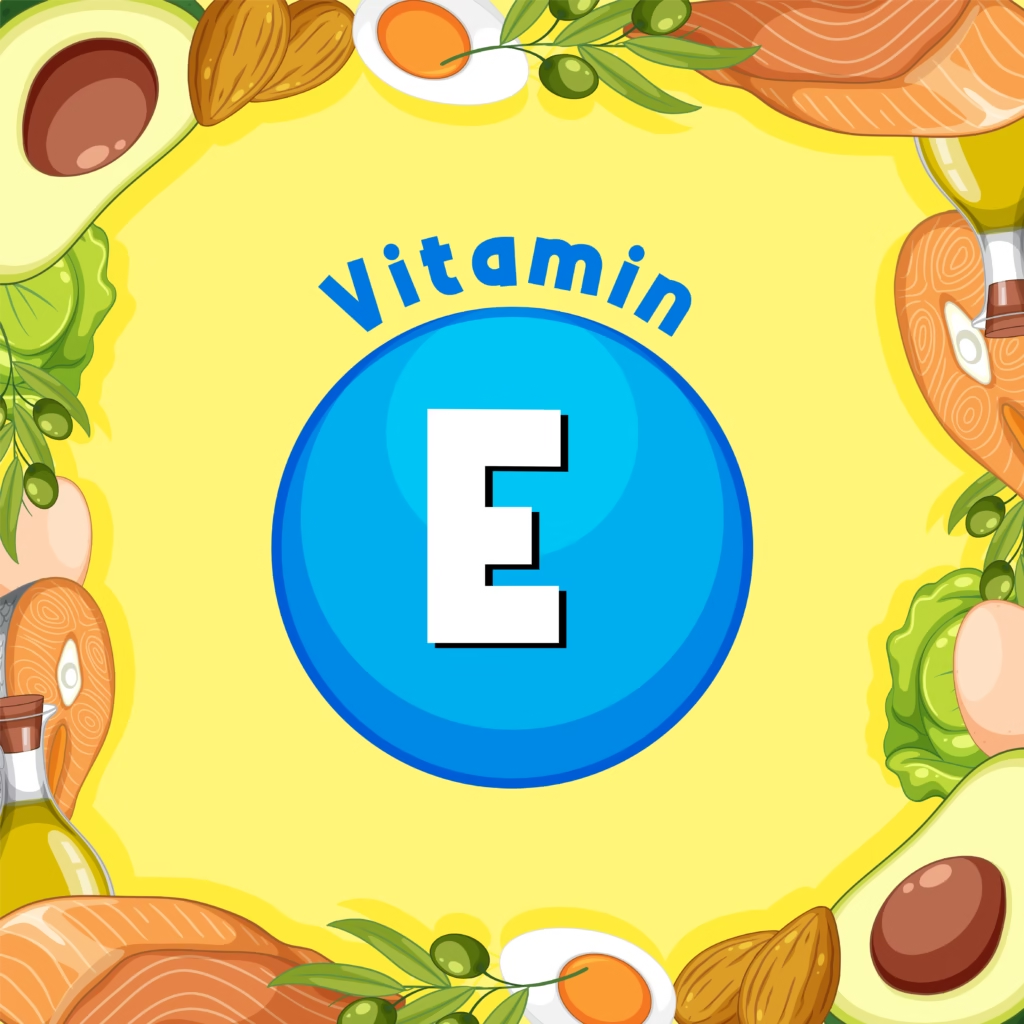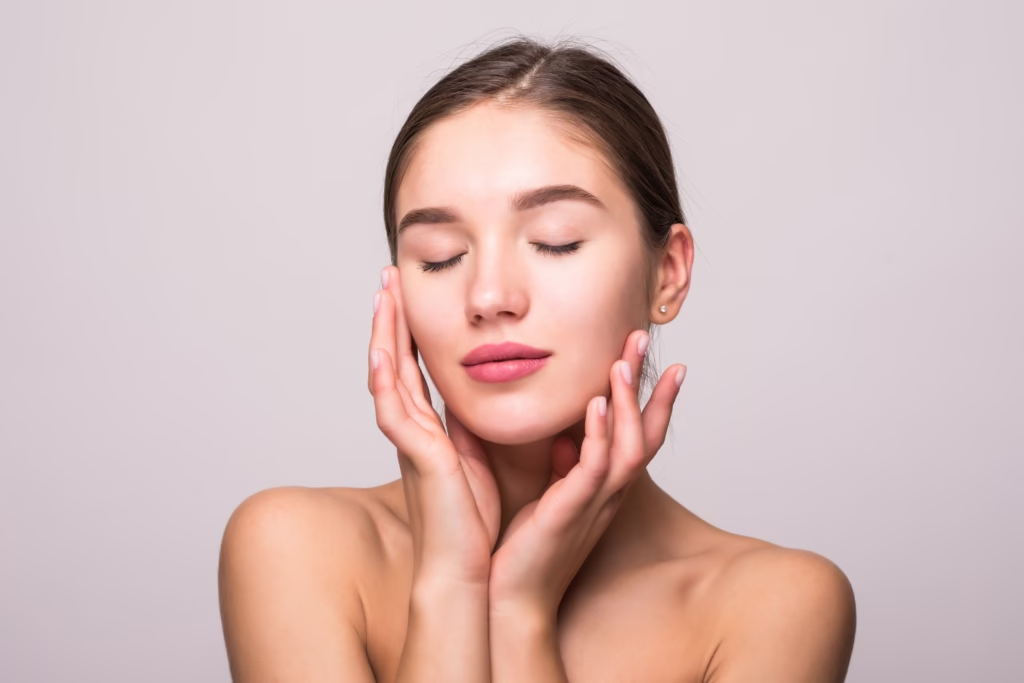When you think of nutrients essential for your well-being, Vitamin C and D often steal the spotlight but there’s another powerful nutrient that deserves a place at the top of your health checklist This fat-soluble antioxidant doesn’t just protect your cells from damage; it’s also a silent hero behind glowing skin, healthy hair, sharp brain function, and even reproductive health.
In this comprehensive article, we’ll explore everything you need to know about Vitamin E—from its health benefits and natural sources to how much you need, what deficiency looks like, and how it supports long-term wellness.

Table of Contents
🧬 What Is Vitamin E and Why Is It Important?
Vitamin E is a group of eight fat-soluble compounds—four tocopherols and four tocotrienols. The most commonly known and used form is alpha-tocopherol, which has the highest biological activity in humans.
Its main job? Getting rid of harmful free radicals that build up in your body and trigger oxidative stress. This action helps shield you from chronic diseases, slows down the aging of your cells, eases inflammation, and lowers your long-term risk of serious illnesses like cancer.
Vitamin E gets stored in your body’s fat tissues and liver, so it sticks around much longer than water-soluble vitamins. That means it’s not about taking large amounts at once—but about being consistent with your intake to make sure your body always has what it needs.
🛡️ Vitamin E as a Powerful Antioxidant
Think of antioxidants as bodyguards for your cells. Every day, your body is exposed to oxidative stress from pollution, sun exposure, stress, poor diet, and processed food. This leads to free radical production, which damages your DNA and speeds up aging.
Vitamin E steps in to stabilize these free radicals and prevent the chain reaction that causes cellular damage. This makes it one of the most important vitamins for long-term disease prevention and vitality.

🧖♀️ The Skin-Beautifying Effects of Vitamin E
Vitamin E and skincare are a perfect match—they work together to keep your skin healthy, nourished, and glowing. It’s a favorite ingredient in many cosmetic products, and for good reason:
🔹 Moisturizes and Repairs
It helps strengthen the skin’s natural moisture barrier, keeping it hydrated and protected from environmental stress.
🔹 Fights Signs of Aging
Vitamin E helps boost cell renewal and supports collagen production, which in turn softens the look of wrinkles, fine lines, and age spots.
🔹 Reduces Inflammation and Redness
Its anti-inflammatory properties soothe irritated skin, especially in cases of eczema, psoriasis, or sunburn.
🔹 Speeds Up Healing
Vitamin E promotes faster healing of scars, wounds, and blemishes—making it a common choice in scar creams.

💇♂️ Vitamin E for Healthy Hair Growth
If your hair is looking dull or you’re experiencing hair fall, Vitamin E might be the fix.
- Improves blood circulation to the scalp, encouraging follicle health.
- It works like a natural conditioner, leaving your hair shinier, smoother, and easier to manage.
- Helps prevent oxidative stress on the scalp that can lead to hair thinning.
Hair oils and serums enriched with Vitamin E can make a noticeable difference over time when applied consistently.
🧠 Vitamin E and Brain Health: Boosting Cognitive Function
The brain is particularly vulnerable to oxidative stress. Over time, this stress contributes to cognitive decline, memory issues, and even neurodegenerative diseases like Alzheimer’s.
Vitamin E:
- Protects neurons by stabilizing cell membranes
- Supports neurotransmitter activity
- May slow cognitive aging, especially in older adults
Some research even suggests that people who consume more Vitamin E through food may have a lower risk of dementia.

👶 The Role of Vitamin E in Fertility and Reproduction
Vitamin E earned the nickname “the fertility vitamin” long ago, and modern science supports that reputation.
- In women, it helps maintain hormonal balance and strengthens the uterine lining, improving chances of implantation.
- In men, it enhances sperm quality, motility, and reduces oxidative damage to reproductive cells.
- During pregnancy, Vitamin E supports placental health and fetal development.
It’s often included in prenatal vitamins for these exact benefits.

🩺 Vitamin E and Immune Health
A healthy immune system needs more than just Vitamin C. Vitamin E plays a crucial role in:
- Enhancing the function of T cells, which are vital for fighting infections.
- Reducing oxidative stress in immune cells, allowing them to perform efficiently.
- Helping the body recover from illness or injury faster.
Older adults, in particular, may benefit from Vitamin E supplementation to maintain strong immune defenses.
🍳 Natural Food Sources Rich in Vitamin E
You can easily meet your daily needs for Vitamin E through a balanced diet. Here are the top natural sources:
🥜 Nuts and Seeds
- Almonds
- Sunflower seeds
- Hazelnuts
- Pine nuts
🌿 Vegetable Oils
- Wheat germ oil (highest source)
- Sunflower oil
- Safflower oil
- Olive oil
🥦 Leafy Greens and Vegetables
- Spinach
- Swiss chard
- Broccoli
- Avocados
🐟 Animal-Based Sources
- Salmon
- Trout
- Eggs
- Liver
🥭 Fruits
- Mangoes
- Kiwis
- Tomatoes
Include a variety of these foods in your daily meals to ensure you get Vitamin E naturally.

📏 How Much Vitamin E Do You Need?
Health experts recommend the following daily intake for Vitamin E, known as the Recommended Dietary Allowance (RDA):
- 15 mg (22.4 IU) per day for adults
- 19 mg per day for breastfeeding women
The upper tolerable limit from supplements is 1,000 mg/day, but such high doses are rarely needed and can cause side effects if used long term.
Pro tip: Natural food sources are safe and effective, while high-dose supplements should only be used with medical advice.
🚨 Symptoms of Vitamin E Deficiency
While rare, a deficiency in Vitamin E can be dangerous, especially in those with:
- Fat absorption disorders (like cystic fibrosis or Crohn’s disease)
- Very low-fat diets
- Genetic conditions like abetalipoproteinemia
Common signs of deficiency include:
- Muscle weakness
- Nerve damage or tingling
- Vision problems
- Poor immune response
- Loss of coordination (ataxia)
If you notice these signs, speak with a healthcare professional for proper evaluation.
💊 Should You Take a Vitamin E Supplement?
Supplements may be useful if:
- You have a diagnosed deficiency
- You suffer from fat-malabsorption issues
- You are undergoing treatment for specific chronic diseases
- You want skin and hair benefits beyond diet
When choosing supplements:
- Choose natural d-alpha-tocopherol, as it’s absorbed more effectively by the body compared to the synthetic form, dl-alpha-tocopherol.
- Avoid megadoses unless prescribed
- Combine with Vitamin C for enhanced antioxidant protection
Remember: supplements complement, not replace, a balanced diet.
🧴 Topical Use of Vitamin E in Skincare
In addition to getting it through your diet, Vitamin E is commonly used on the skin. You’ll often see it in products like:
- Moisturizers
- Serums
- Eye creams
- Lip balms
- After-sun products
Topical benefits include:
- Calming inflammation
- Repairing damaged skin
- Soothing sunburns
- Reducing scars and pigmentation
You can even use Vitamin E oil capsules directly on the skin (with care and patch-testing).
🧪 Vitamin E and Disease Prevention
New scientific findings associate Vitamin E intake with a decreased likelihood of several diseases.
- Cardiovascular diseases: By preventing oxidation of LDL cholesterol
- Age-related eye disorders: Like cataracts and macular degeneration
- Type 2 Diabetes complications: Through anti-inflammatory effects
- Cancer prevention: Still debated, but promising in certain cases
It’s not a magic bullet, but Vitamin E plays a role in overall chronic disease management.
✅ Conclusion: Add the “E” Factor to Your Health Plan
Vitamin E may not always be in the health spotlight, but its benefits are wide-ranging and scientifically supported. From protecting your skin and boosting fertility to supporting your immune system and brain, it’s truly a multifunctional antioxidant powerhouse.
To harness its full potential:
- Eat a diet rich in nuts, seeds, green veggies, and healthy oils
- Use topical Vitamin E products for targeted skin and hair care
- Consider supplements only when needed
Make Vitamin E part of your daily routine, and your body, mind, and skin will thank you.
Coming Next: Vitamin K – The Unsung Hero of Blood Clotting and Bone Health
In the next article, we’ll explore Vitamin K, its vital role in blood clotting, bone strength, heart health, and cellular function—plus the best natural sources and why this nutrient is especially important as you age.
